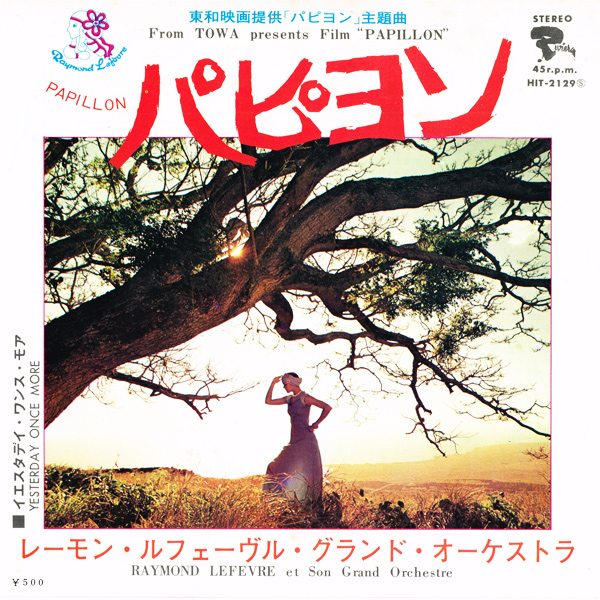45 R.P.M.: PAPILLON

HIT-2129 S, King Record Co. Ltd., Japan. P '74-4. Recorded by Riviera (France)
- Papillon (Toi que regardes la mer) (3:25) (J. Plante, J. Goldsmith)
- Yesterday Once More (4:02) (R. Carpenter, J. Betis)
SLEEVE NOTES:
Music with beautiful melodies is good, but that alone makes it outdated. Raymond Lefèvre says that it is our job to add new harmonic and rhythmic elements to these beautiful melodies and create something that fits our modern sensibilities. His music is sure to bring comfort to those of us who live in today's world in a fraught state.
Raymond Lefèvre and his Grand Orchestra have recorded a new coupling for his many fans, and that is this record.
The Lefebvre Orchestra, which had been popular with many fans for its hit songs such as "Âme Câline," "Queen of Sheba," and "Lady D'Arbanville," first came to Japan in April 1972, and came back to Japan this March 1974 with its wonderful sound. The concert was so well-received before the first concert that the tickets were sold out a month in advance, causing the promoters to scream with delight, a phenomenon that is rare in recent years.
I was impressed that the Japanese fans, who are supposed to be tired of foreign talents, did not miss this "good music" concert, and at the same time, I was impressed by how wonderful Lefèvre's music is. I was also impressed by how wonderful Lefèvre's music is.
The coupling of the theme from the popular movie "Papillon" and the Carpenters' hit number "Yesterday Once More," which Lefebvre's orchestra played on stage in Japan, will be a good memory for those who went to the concert, and for those who did not go to the concert, it will be a great experience.
For those who did not go to the concert, this coupling will deepen the appeal of the Lefebvre sound.
Side A. Papillon:
A man called Papillon because of the butterfly irezumi on his chest is abandoned by both society and his homeland, and is sent to a prison in French Guiana, South America, on a charge of murder.
During his 13 years in prison, Papillon, like a butterfly trying to fly to the sky in search of freedom, plans several escape attempts, fails, and is thrown into solitary confinement.
The movie "Papillon," which depicts the lives of these two completely different men, was the talk of the spring of 1974, and is an adaptation of the true story "Papillon" written by Henri Charrière based on his own experiences.
The novel was a bestseller, selling 10 million copies, and the movie was also well-received for its huge budget of 4 billion yen and for the two stars, Steve McQueen and Dustin Hoffman, whose powerful performance as Papillon, played by McQueen, reportedly brought the original author Charrière to tears.
The theme song, written by Jerry Goldsmith (music) and Hal Schaper (lyrics) and sung by Engelbert Humperdinck, is a hit, but Lefebvre's orchestra plays it not with a chilly sense of the human psyche in detention, but with a hopeful brightness of a butterfly that may take to the air at some point. Lefèvre's orchestra plays the image of a butterfly that may fly into the sky at some point with a hopeful brightness, rather than the chilly psychology of a human being in detention.
Side B Yesterday Once More:
This song, written by Richard Carpenter and composed by John Betties, was a hit number by the Carpenters, who are now at the height of their popularity, and charted on the U.S. hit parade around June 1973, becoming a hit number in the second half of 1973.
This song is from the Carpenters' LP titled "Now and Then," in which the song is about reminiscing about the days gone by and fondly remembering the rock 'n' roll songs heard on the radio as a child. You can enjoy the beautiful arrangement by Lefebvre, who makes the strings sing beautifully.
Fumio Ueki
Recorded by RIVIERA, France
Note: Translation made by online translator.
